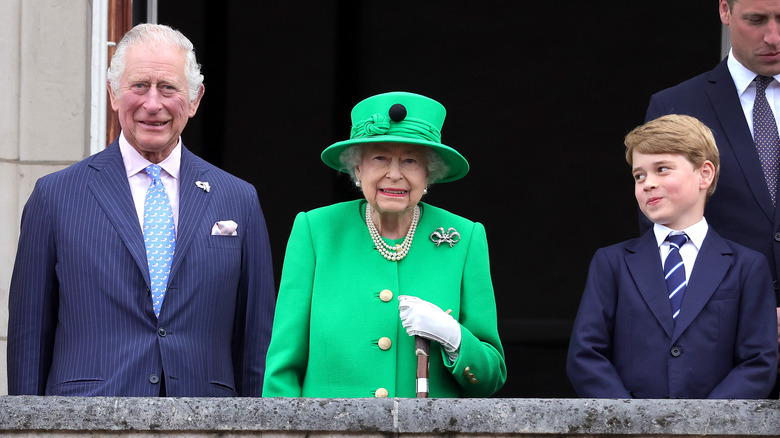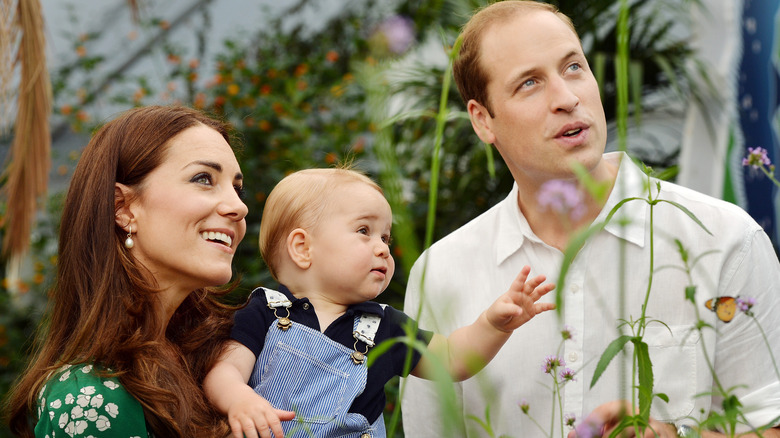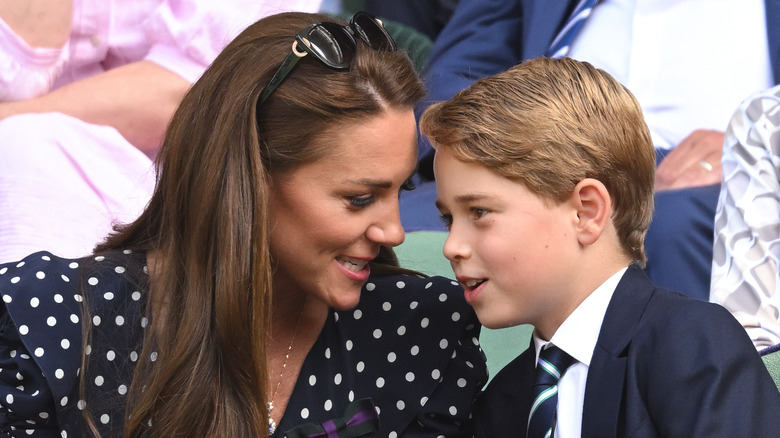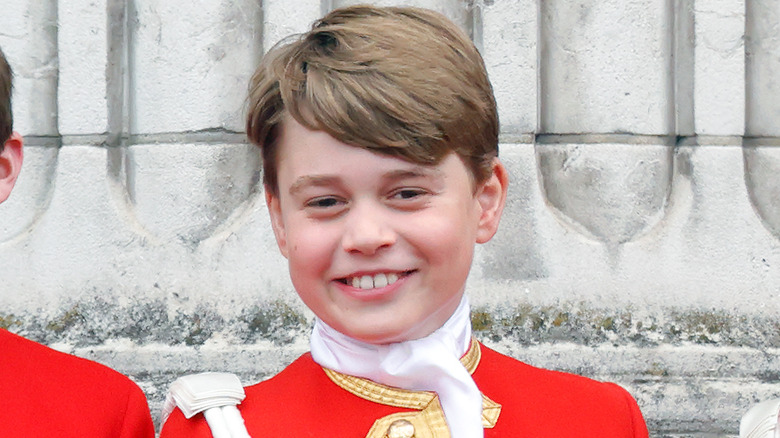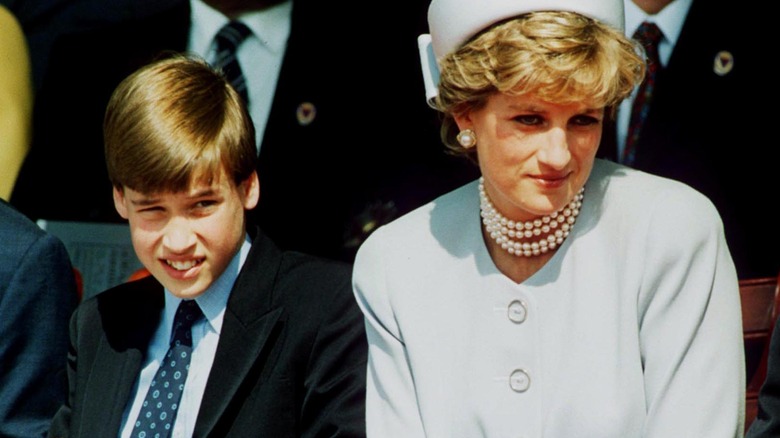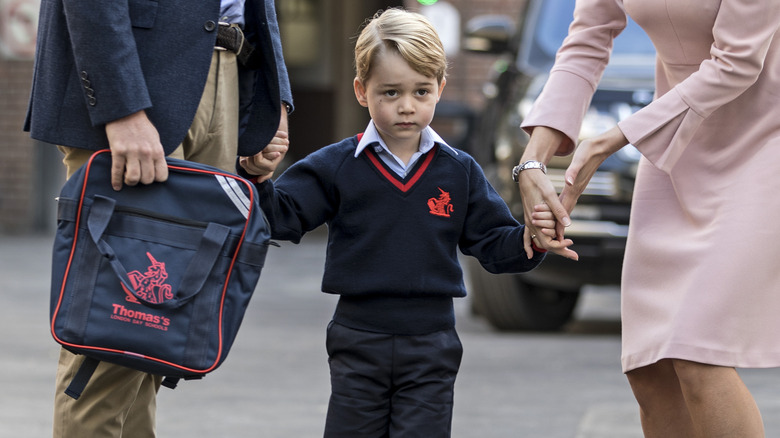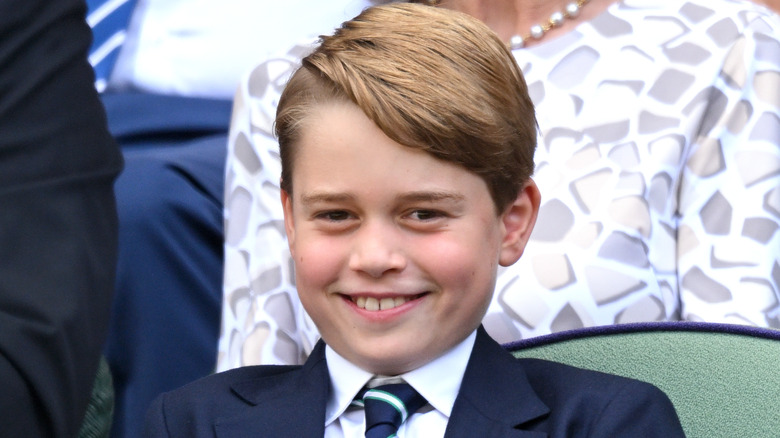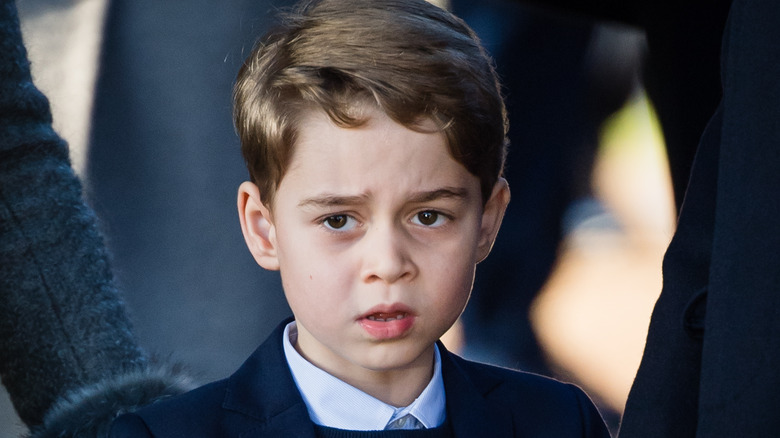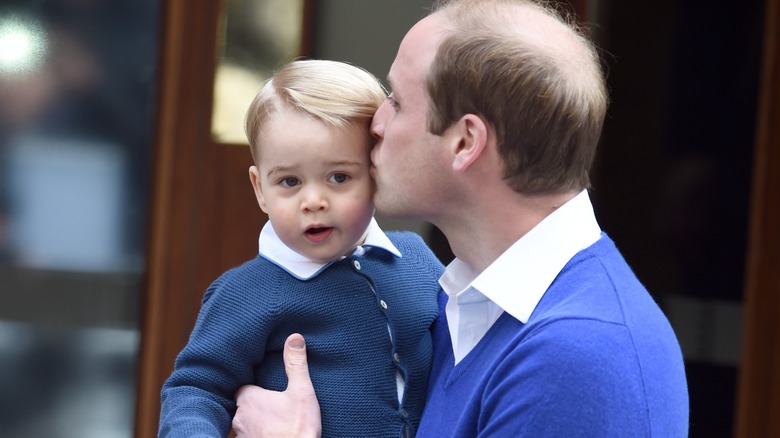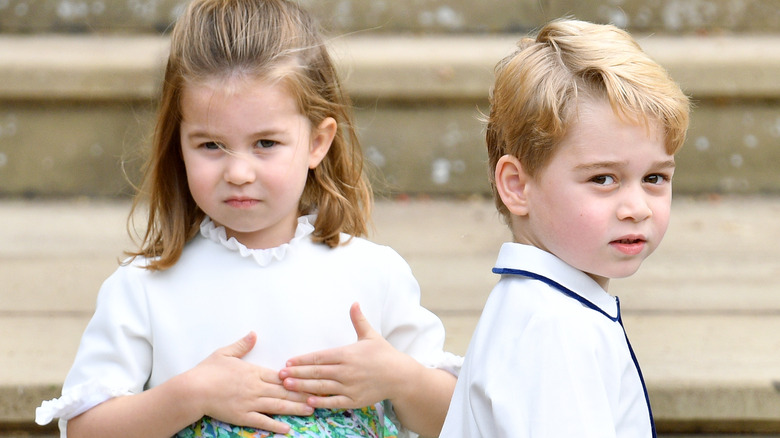All Of The Ways Prince George's Childhood Is Different Than King Charles III's
As second in line to the throne, Prince George of Wales needn't worry about his kingly duties any time soon. The youngster will therefore have greater freedom to enjoy his youth on his own terms than, say, his late great-grandmother Queen Elizabeth II, who was thrust onto the throne at the tender age of just 25. This is in stark contrast to his grandfather, King Charles III, who, as first in line to the throne for seven decades, always seemed to be in the shadow of his much-loved mom.
With some critics arguing that the monarchy does not align with the values of modern-day Britain, and may very well end with the reign of King Charles III, only time will tell whether George will actually ascend the throne in the decades to come. Coming from a highly traditional background steeped in strict royal etiquette and protocol, Charles has vowed to modernize the monarchy, but many have questioned whether someone so embedded in the establishment can effectively live up to such a promise.
But as a tech-savvy Generation Alpha kid, George may actually be able to offer genuinely progressive leadership as the future king. Indeed, his childhood, though extraordinarily privileged, has been vastly different from that of his grandfather. Uneasy lies the head that wears a crown: Let's take a look at all of the ways Prince George's childhood is different than King Charles'.
Prince William and Princess Catherine want their son to have a normal childhood
When King Charles III was just 3 years old, his mom became queen. Being the son of Britain's head of state meant that Charles had a rather unusual childhood. His mother rarely had time for him, with her duties to her country coming first. As such, the erstwhile Prince of Wales often felt lonely as a youngster, relying on his nanny as a maternal figure (tellingly, his first word was "nana"), in lieu of his busy mom.
This is in marked contrast to Prince George's childhood. At the time of his birth in 2013, George was third in line for the throne and his father second, meaning that Prince William and Princess Catherine had more time to devote to him. Knowing all too well the pressures that the line of ascension entails, William and Catherine have been determined to give George a normal childhood, one entirely disparate from that of Charles. "Royal families over the generations haven't had the chance to get those foundations right, but they have," a family friend explained to People.
For instance, it was pretty common for the young Charles to be left to his own devices at home while his mom strictly adhered to her hectic schedule, always with her loyal husband Prince Philip by her side. By contrast, George has been accompanying his parents to major events since he was a baby, having joined them on a trip down under when he was 9 months old.
Prince George's mom was not born into an aristocratic family
Whereas King Charles III was born into old money aristocracy, Prince George's mom is from an ordinary, albeit wealthy, family, having only secured regal status when she wed Prince William. In contrast to Queen Elizabeth II, whose parents were both of noble stock, Princess Catherine's parents are self-made millionaires who owned a party supply company, Party Pieces. As is common in family businesses, Kate even lent a helping hand to developing Party Pieces' first-ever birthday and baby line, as her mom revealed to Sheer Luxe.
As sources explained to People, it's Kate's normalcy that appealed to William. "That's how she grew up," an insider said. "William absolutely loves it." Accordingly, her background has enabled her to impart a more down-to-earth approach to parenting. For instance, it's commonplace for the aristocratic class to uphold stoicism and distance when interacting with their children, a concept that's alien to Kate. "Coming from a different background, she appreciates the importance of having family time," a source said. "She wasn't brought up in that aristocratic setting where you see the children for a short time each day."
During an appearance on the "Happy Mum, Happy Baby" podcast, Kate revealed that she loves encouraging her kids to get mucky and explore the great outdoors, something that Charles never got to experience as a child. She said that she's happiest when "I'm with my family outside in the countryside, and we're all filthy dirty."
Prince George won't be spending his childhood in Buckingham Palace
Buckingham Palace is one of the most enduring symbols not only of the royal family but the United Kingdom. As one would expect from the future king, King Charles III spent his early years at Bucks. Though Charles' childhood was often a lonely one, he found much solace in his idyllic home, as he revealed in an interview with BBC Radio 4 (via Hello!). "There was a wonderful head gardener at Buckingham Palace, he was called Mr. Nutbeam, rather splendidly," he fondly recalled. "He was splendid, and helped us a bit ... with the little garden we had."
Over the years, Buckingham Palace has become less of a consistent residence of the royal family. Accordingly, Prince George spent his formative years in a far more secluded dwelling: Anmer Hall, located in the Norfolk countryside. "Spending their children's early years at Anmer has given the royal couple a chance to give them time out of the spotlight ... They want them to enjoy the same everyday experiences of other children their age," a source told Hello!, "Like going to the shops, the playground, or petting zoo without any fuss."
In 2017, William and Kate left Anmer Hall and moved their children into the lavish Apartment 1A in Kensington Palace. Five years later, they relocated to the suburbs, raising their children in the modest, four-bedroom Adelaide Cottage in Windsor. "They were adamant they didn't want anything too showy," a source told The Sun.
Prince George never got to meet his paternal grandmother
Both of King Charles III's grandmothers, Princess Alice of Battenberg and the Queen Mother, lived to see him reach adulthood. In fact, the latter didn't die until 2002, when Charles was 53. By contrast, Prince George only has one living grandmother, Princess Catherine's mom, Carole. His paternal grandmother, Princess Diana, died in a car crash in 1997, 16 years before his birth.
Although George never got to meet his iconic grandmother, Prince William and Princess Catherine are ensuring that he learns all about her. "I do [when] regularly putting George or [Princess] Charlotte to bed, talk about her," William said in the HBO documentary "Diana: Her Life and Legacy," "And just try and remind them that there are two grandmothers, there were two grandmothers in their lives, and so it's important that they know who she was and that she existed." William explained that he made an effort to keep lots of photos of his mom around the house so that George could grow accustomed to the grandmother he never knew.
In addition to teaching George about his late grandma, William is also reportedly garnering parenting inspo from her. Unlike Queen Elizabeth II, who was a staunch traditionalist, Di was famed for breaking convention, meaning that George will in turn have an unconventional upbringing — for a royal, at least. "If the kids misbehave, William often thinks to himself, 'What would my mom have done in this situation?'" a source told Us Weekly.
Unlike his grandfather, Prince George attended inclusive prep schools
Though King Charles III's pledge to be a modern monarch has been met with cynicism, he has actually been breaking royal tradition since he was a young boy. In 1956, the then-8-year-old prince started attending Hill House School, a prestigious prep school in London. The decision to send him to a traditional school environment was pioneering at the time, since royals had hitherto been home-schooled by private tutors (indeed, the queen and her sister, Princess Margaret, never went to school). Soon, he attended another prep, Cheam School in Hampshire. Thereafter, he was sent to board at Gordonstoun in Scotland, which he hated due to its strict and cruel regime.
However, Prince George has been educated at vastly different prep schools from his grandfather. In 2017, he began attending Thomas's London Day School in the posh South London area of Battersea. In marked contrast to Gordonstoun, Thomas's upholds the motto of "Be Kind," exemplifying how much private schools have changed since Charles' youth.
"The Duke and Duchess have made it clear that they do not wish Prince George's attendance at Thomas's to change its aims, values, or ethos in any way," the school said in a statement, per Hello!. "They would like, as far as is possible, for him to enjoy the same education that all of our pupils receive." After leaving Thomas's, George enrolled at Lambrook School in Windsor, which is conveniently nearby to his home, Adelaide Cottage.
Prince George is growing up in — and embracing — the tech age
King Charles III grew up in a time when personal technology was in its infancy. Considering the technological advances that have taken force throughout the 21st century, it comes as little surprise that Prince George is a royal surrounded by ubiquitous digital media.
As Prince William revealed in a 2014 chat with Ayah Bdeir, CEO of the company littleBits, his toddler was already exhibiting a penchant for tech. "He told me that his son George has been playing iPad games and loves them and that this was a good way to teach him the inner workings of electronics," Bdeir said (per Today). Royal expert Katie Nicholl echoed similar anecdotes in an interview with OK!. "George enjoys his iPad at school, both he and [Princess] Charlotte are quite tech-savvy," she said.
But George's passion for tech has led to some anxiety for his parents. In 2018, William took part in Anti-Bullying Week at the BBC and criticized the normalization of handing kids iPads. As such, he expressed his fears over giving his own children electronic devices at such a young age. "I saw that my friends and peers were worried about the risks of the very powerful tools we were putting in our children's hands ... Should we read our children's messages?" he asked, per Hello!. "Should we allow them to have phones and tablets in their rooms? Who do we report bullying to? We were making up the rules as we went along."
There is a greater prevalence of paparazzi in Prince George's childhood
Both King Charles III and Prince George have faced childhood struggles due to media intrusion. However, when Charles was a growing boy, the public fascination with his life was confined to those with unique access to the royal family, such as specialized photographers, as opposed to independent tabloid paps.
But Prince George is living in a very different era indeed. His infancy was blighted by constant and excessive paparazzi intrusion. This led to Prince William and Princess Catherine's press secretary, Jason Knauf, releasing a statement (via ITV) warning the press to back off and leave their young son alone. "Paparazzi photographers are going to increasingly extreme lengths to observe and monitor Prince George's movements," Knauf stated, "and covertly capture images of him to sell to the handful of international media titles still willing to pay for them." He cited one horrifying incident in particular, in which a photographer staked out a play area in a car with tinted windows, attempting to capture candids of George. "Police discovered him lying down in the boot of the vehicle attempting to shoot photos with a long lens through a small gap in his hide," he added.
In the following years, Kate effectively negated the role of the paparazzi by releasing photos of George that she takes herself. "Releasing such intimate family photos so regularly to the press has killed, stone dead, the market for paparazzi shots," royal expert Camilla Tominey wrote in The Telegraph.
Prince George has a closer bond with his father than King Charles III
Young King Charles III had to contend with both an absent mom devoted to her country and an austere authority figure in his father, Prince Philip. In the book "Prince Philip Revealed," Ingrid Seward revealed that the macho Philip grew frustrated with his eldest son, whom he deemed overly sensitive, as reflective of patriarchal gender roles of the era. He tried to force the shy Charles to undertake traditionally masculine sports, such as boxing, in order to man him up. "I think Philip tolerated Charles, but he wasn't a loving father," family friend Eileen Parker told the author. "I think Charles was frightened of him. I never saw him spank his children, but he had a rough manner and could be incredibly cutting ... He became very quiet when Philip was around."
As sensibilities have progressed, so has parenting. A thoroughly 21st-century prince, Prince William has not adopted his grandfather's stern approach to fatherhood. As royal expert Jennie Bond explained to OK!, Wills is a loving and laidback father who is enthusiastic about embracing a more progressive cultural climate.
Consequently, William and George have the close father-son relationship that Charles sadly never had with Philip, with the pair sharing many of the same pastimes. "He's definitely a daddy's boy," an insider told Us Weekly. "It's not just their physical resemblance, they've got a ton of the same interests and hobbies in common — even helicopters!"
King Charles III was bullied at school, but Prince George is more headstrong
Despite all his privileges, King Charles III did not have an easy start in life. At Gordonstoun, he was bullied relentlessly, something that had a profound and traumatic effect on him into adulthood.
Writing for The Telegraph, his former school chum Johnny Stonborough acknowledged that bullying was prevalent at Gordonstoun, with older boys picking on the youngsters. But due to his royal status, Charles in particular was targeted and subsequently ostracized by the other children, who were discouraged from befriending him. "He had it harder ... It was common knowledge he was attacked in his dormitory; tipped out of bed while sleeping, that sort of stuff," Stonborough wrote. He recalled one harrowing instance in which Charles, who is known for having prominent ears, was grabbed by the lobes and punched during a rugby game.
Meanwhile, Prince George has proved himself a cheeky, headstrong lad who has seemingly kept the bullies away by wielding power over his commoner peers. And Georgie is apparently capable of throwing some serious shade: "George understands he will one day be king," Katie Nicholl dished to Heart, "and as a little boy sparred with friends at school, outdoing his peers with the killer line: 'My dad will be king so you better watch out.'" However, some detractors were quick to point out that George may have made the remark as a way of scaring off bullies.
